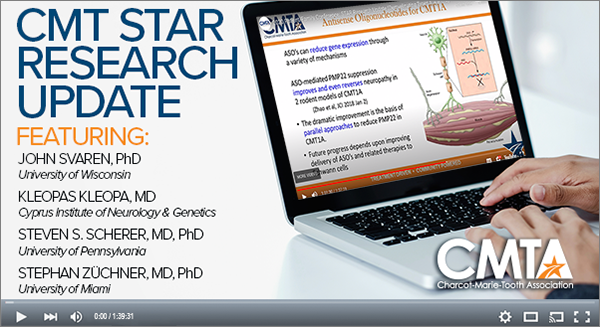AXONAL FORMS OF CMT (Type 2 and Unidentified/SORD)
The CMTA’s Strategy to Accelerate Research, or STAR, has been a beacon of light and hope for the CMT community since 2008. Its unique approach is built on collaboration: It connects our world-renowned STAR Advisory Board to pharmaceutical, biotechnology and research service companies that are pursuing therapy development. These STAR alliance members, along with the CMT patients who are the real experts and donors who support our work, complement a network of sponsored university laboratories and biotech companies positioned to deliver therapies to the market in the near future. The CMTA’s funding and operations focus is on translational research that will lead as directly as possible to therapeutic treatments for CMT.
Axonal forms of CMT affect the “electrical wire” that is the nerve, which is surrounded by the protective insulator coating known as myelin. Research specific to axonal CMT—Types 2 and 4—includes some two dozen projects. You can read more below about the strategies in place for tackling CMT research from all angles: gene therapy and editing, small molecule and biological therapy and clinical trial preparation. You can also learn more about the research happening by axonal Type 2 subtypes, unidentified types and SORD. If you would like to have a more in-depth conversation about STAR please reach out to Jeana Sweeney, Chief Engagement and Gift Officer: jeana@cmtausa.org.
READ MORE ABOUT CMTA-STAR RESEARCH FOR AXONAL TYPES OF CMT
GENE THERAPY AND GENE EDITING PROJECTS
- The CMTA is supporting pilot studies of gene therapy in CMT mouse models following a gene therapy trial for one peripheral neuropathy (GAN) at the National Institutes of Health.
- We are partnering with Dr. James Wilson at the University of Pennsylvania and Passage Bio to use gene therapy to treat CMT2A.
- We are funding work with two eminent experts, Drs. Bruce Conklin and Luke Judge of the Gladstone Institutes and UCSF Departments of Medicine and Pediatrics, to explore therapeutic application of genome editing technology (CRISPR) to CMT2A, CMT2E and CMT2F.
SMALL MOLECULE AND BIOLOGICAL THERAPY PROJECTS
- CMTA partners are working on developing molecules that regulate recently identified biochemical triggers of axon degeneration. The CMTA plans to explore the applicability of this recent technology to multiple forms of CMT2 using models of CMT that have been generated by our partners at Jackson Laboratories.
- The most common cause of CMT2A is mutation of the Mitofusin 2 gene. Researchers have recently identified custom-designed molecules that can stimulate the activity of mitofusin proteins and we are discussing with them the possibility of testing this therapy in our recently developed rat models of CMT2A.
- We are funding Dr. Mario Saporta’s work at the University of Miami using human stem cells to develop assays and test additional libraries of drugs for treatment in CMT2E.
- We are supporting work in Dr. Ron Liem’s lab at Columbia University to screen already FDA-approved compounds to treat CMT2E.
- The CMTA is supporting a new project to bring gene therapy to CMT2E, which is being conducted by Dr. Kathrin Meyer and a leading gene therapy group at Nationwide Children’s Hospital in Cincinnati.
UNDIAGNOSED TYPE 2
Approximately 50 percent of CMT2 patients do not yet have a definitive genetic diagnosis. Dr. Stephan Züchner at the University of Miami is working to change that, spearheading an ambitious project to identify new disease-causing mutations in patients seen in the Inherited Neuropathy Consortium (INC).
PREPARING FOR CLINICAL TRIALS
In partnership with INC, we are building on their recent successes in development of novel biomarkers and outcome measures in CMT1A, and supporting major efforts to extend development and testing of critical biomarkers for CMT2A in order to support the efficient design of upcoming clinical trials.
CMTA-STAR OVERVIEW AND RESEARCH UPDATE
This is an in-depth STAR research update led by CMTA Board Chair Gilles Bouchard and accompanied by CMT scientists and researchers Drs. Svaren, Kleopa, Scherer and Züchner. They share a detailed presentation about the CMTA’s STAR research program and provide updates on the studies being done on CMT by type.






